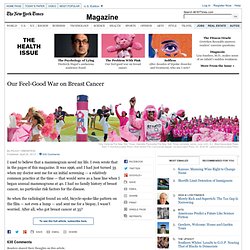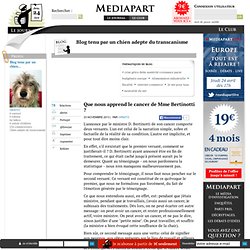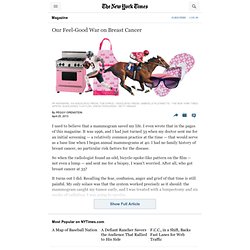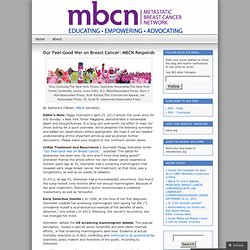

Our Feel-Good War on Breast Cancer. So when the radiologist found an odd, bicycle-spoke-like pattern on the film — not even a lump — and sent me for a biopsy, I wasn’t worried.

After all, who got breast cancer at 35? It turns out I did. Recalling the fear, confusion, anger and grief of that time is still painful. My only solace was that the system worked precisely as it should: the mammogram caught my tumor early, and I was treated with a lumpectomy and six weeks of radiation; I was going to survive. By coincidence, just a week after my diagnosis, a panel convened by the National Institutes of Health made headlines when it declined to recommend universal screening for women in their 40s; evidence simply didn’t show it significantly decreased breast-cancer deaths in that age group. Those conclusions hit me like a sucker punch. Sixteen years later, my thinking has changed. Breast cancer in your breast doesn’t kill you; the disease becomes deadly when it metastasizes, spreading to other organs or the bones. Cholesterol may spur spread of breast cancer. Benefit risk assessment and update on the use of docetaxel in the management of breast cancer.
Dominique Bertinotti : "J'ai un cancer" Dominique Bertinotti, ministre et malade du cancer. Que nous apprend le cancer de Mme Bertinotti ? L'annonce par le ministre D.

Bertinotti de son cancer comporte deux versants. L'un est celui de la narration simple, sobre et factuelle de la réalité de sa condition. L'autre est implicite, et pour tout dire moins clair. En effet, s'il n'existait que le premier versant, comment se justifierait-il ? D. Pour comprendre le témoignage, il nous faut nous pencher sur le second versant. Ce que nous entendons aussi, en effet, est: pendant que j'étais ministre, pendant que je travaillais, j'avais aussi un cancer, je subissais des traitements.
Bien sûr, ce second message aura une vertu: celui de signifier aux peureux, aux obtus présents sur le lieu de travail et ailleurs, qu'un malade du cancer n'est pas un pestiféré. Or, le cancer est un scandale. Dans ce domaine, la France est plus scandaleuse que tout autre pays: elle est en tête des pouvoyeurs dans l'environnement des pesticides, des nitrates, particules fines. Our Feel-Good War on Breast Cancer. Faces of Breast Cancer - Well. Our Feel-Good War on Breast Cancer. I used to believe that a mammogram saved my life.

I even wrote that in the pages of this magazine. It was 1996, and I had just turned 35 when my doctor sent me for an initial screening — a relatively common practice at the time — that would serve as a base line when I began annual mammograms at 40. I had no family history of breast cancer, no particular risk factors for the disease. So when the radiologist found an odd, bicycle-spoke-like pattern on the film — not even a lump — and sent me for a biopsy, I wasn’t worried. After all, who got breast cancer at 35? It turns out I did. By coincidence, just a week after my diagnosis, a panel convened by the National Institutes of Health made headlines when it declined to recommend universal screening for women in their 40s; evidence simply didn’t show it significantly decreased breast-cancer deaths in that age group.
Those conclusions hit me like a sucker punch. Sixteen years later, my thinking has changed. The campaign worked — sort of. Our Feel-Good War on Breast Cancer: MBCN Responds. Tony Cenicola/The New York Times; Gabrielle Plucknette/The New York Times (umbrella, socks, oven mitt); A.J.

Mast/Associated Press; Nam Y. Huh/Associated Press; Kyle Kurlick/The Commercial Appeal, via Associated Press; Dr. Scott M. Lieberman/Associated Press By Katherine O’Brien, MBCN Secretary Editor’s Note: Peggy Orenstein’s April 25, 2013 article–the cover story for this Sunday’ s New York Times’ Magazine, demonstrates a remarkable depth and thoughtfulness. Initial Treatment and Recurrence | Journalist Peggy Orenstein wrote “Our Feel-Good War on Breast Cancer,” subtitled “The battle for awareness has been won.
In 2012, at age 52, Orenstein had a nonmetastatic recurrence. Early Detection Doubts | In 1996, at the time of her first diagnosis, Orenstein credited her screening mammogram with saving her life.